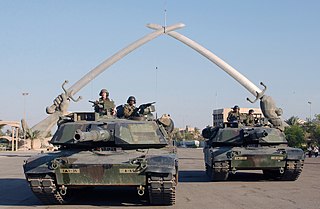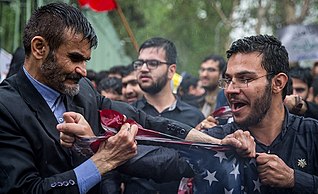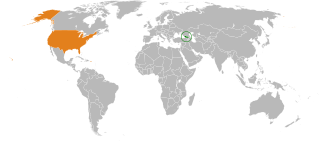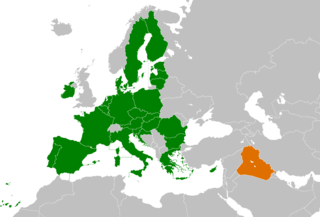
The United States public's opinion on the invasion of Iraq has changed significantly since the years preceding the incursion. For various reasons, mostly related to the unexpected consequences of the invasion, as well as misinformation provided by US authorities, the US public's perspective on its government's choice to initiate an offensive is increasingly negative. Before the invasion in March 2003, polls showed 47–60% of the US public supported an invasion, dependent on U.N. approval. According to the same poll retaken in April 2007, 58% of the participants stated that the initial attack was a mistake. In May 2007, the New York Times and CBS News released similar results of a poll in which 61% of participants believed the U.S. "should have stayed out" of Iraq.

This article describes the positions of world governments before the actual initiation of the 2003 invasion of Iraq, and not their current positions as they may have changed since then.

Opposition to the Iraq War significantly occurred worldwide, both before and during the initial 2003 invasion of Iraq by a United States–led coalition, and throughout the subsequent occupation. Individuals and groups opposing the war include the governments of many nations which did not take part in the invasion, including both its land neighbors Canada and Mexico, its NATO allies in Europe such as France and Germany, as well as China and Indonesia in Asia, and significant sections of the populace in those that took part in the invasion. Opposition to the war was also widespread domestically.

Anti-Americanism is a term that can describe several sentiments and positions including opposition to, fear of, distrust of, prejudice against or hatred toward the United States, its government, its foreign policy, or Americans in general.

Opposition to United States involvement in the Vietnam War began with demonstrations in 1965 against the escalating role of the United States in the Vietnam War and grew into a broad social movement over the ensuing several years. This movement informed and helped shape the vigorous and polarizing debate, primarily in the United States, during the second half of the 1960s and early 1970s on how to end the Vietnam War.
The Iraq War began with the US-led 2003 invasion of Iraq. The Government of Canada did not at any time formally declare war against Iraq, and the level and nature of this participation, which changed over time, was controversial. Canada's intelligence services repeatedly assessed that Iraq did not have an active WMD program.

Veterans for Peace is an organization founded in 1985. Initially made up of US military veterans of World War II, the Korean War, the Vietnam War, the Gulf War, the War in Afghanistan and the Iraq War, and as well as peacetime veterans and non-veterans, it has since spread overseas and has an active offshoot in the United Kingdom. The group works to promote alternatives to war.

The proposed invasion of Afghanistan prompted protests with mass demonstrations in the days leading up to the official launch of the war on October 7, 2001. The continuation of the war in Afghanistan from 2001 to 2021 lead to further protest and opposition to hostilities.
Opposition to the War in Afghanistan (2001–2021) stemmed from numerous factors, including the view that the United States invasion of Afghanistan was illegal under international law and constituted an unjustified aggression, the view that the continued military presence constituted a foreign military occupation, the view that the war did little to prevent terrorism but increased its likelihood, and views on the involvement of geo-political and corporate interests. Also giving rise to opposition to the war were civilian casualties, the cost to taxpayers, and the length of the war to date.

Official relations between Poland and the United States on a diplomatic level were initiated in 1919 after Poland had established itself as a republic after 123 years of being under foreign rule from the Partitions of Poland. However, ties with the United States date back to the 17th century, when the Polish–Lithuanian Commonwealth was one of Europe's largest powers, and many Poles immigrated to the Thirteen Colonies. During the American Revolutionary War, the Polish military commanders Tadeusz Kościuszko and Casimir Pułaski contributed greatly to the Patriot cause, with Kościuszko becoming a national hero in America. Since 1989, Polish–American relations have been strong and Poland is one of the chief European allies of the United States, being part of both NATO and the European Union. There is a strong cultural appreciation between the two nations (Polonophilia). According to the US Department of State, Poland remains a "stalwart ally" and "one of strongest Continental partners in fostering security and prosperity, throughout Europe and the world." Poland was also one of four participating countries in the American-led Iraq War coalition in 2003.

The role of the media in the perception of the Vietnam War has been widely noted. Intense levels of graphic news coverage correlated with dramatic shifts of public opinion regarding the conflict, and there is controversy over what effect journalism had on support or opposition to the war, as well as the decisions that policymakers made in response.

Relations between the countries of Georgia and the United States continue to be very close and encompass multiple areas of bilateral cooperation. One of the key U.S. allies in Eastern Europe, Georgia was the third largest troop contributor in the Iraq War and the largest per-capita contributor to the U.S. led mission in Afghanistan. The United States for its part is actively assisting Georgia in strengthening its state institutions in face of increasing pressure from its northern neighbor Russia and has provided the country with financial assistance in excess of 3 billion dollars since 1991. Since 2009, Georgian–American relations are streamlined by the U.S.–Georgia Charter on Strategic Partnership, which created four bilateral working groups on priority areas of democracy; defense and security; economic, trade, energy issues, people-to-people and cultural exchanges.
A 47-nation global survey of public opinion conducted in June 2007 by the Pew Global Attitudes Project found considerable opposition to the NATO military operations in Afghanistan. In 2 out of the 47 countries was there a majority that favoured keeping troops in Afghanistan – Israel (59%) and Kenya (60%). On the other hand, in 41 of the 47 countries pluralities wanted NATO troops out of Afghanistan as soon as possible. In 32 out of 47 countries majorities wanted NATO troops out of Afghanistan as soon as possible. Majorities in 7 out of 12 NATO member countries wanted troops withdrawn as soon as possible.

Iraq – European Union (EU) relations are the international relations between Iraq and the EU. Relations have been strained from the early 1990s but are now gradually progressing. From Brussels, Iraq has mostly been considered as falling under the U.S. area of responsibilities, independently from the close economic ties between certain European states and Saddam Hussein’s Iraq prior to the international sanctions regime, or the participation of five European countries in the U.S.-led invasion and occupation of the country. Should Turkey's accession to the EU take place, Iraq will border the European Union.

Ohio has been involved in regional, national, and global conflicts since statehood. As a result of the global conflicts, the American Veterans of Foreign Service was established in 1899 in Columbus, ultimately becoming known as the Veterans of Foreign Wars in 1913. The state has produced 319 Medal of Honor recipients, including the first recipient of the award in the country Jacob Parrott.

An anti-war movement is a social movement, usually in opposition to a particular nation's decision to start or carry on an armed conflict. The term anti-war can also refer to pacifism, which is the opposition to all use of military force during conflicts, or to anti-war books, paintings, and other works of art. Some activists distinguish between anti-war movements and peace movements. Anti-war activists work through protest and other grassroots means to attempt to pressure a government to put an end to a particular war or conflict or to prevent it in advance.
The Republican Party of the United States has held a variety of views on foreign policy and national defense over the course of its existence. Generally speaking, it has advocated for a more militaristic foreign policy. Republican presidents have joined or started a number of wars over the course of American history, with mixed results.

On 24 February 2022, Russia invaded Ukraine in a major escalation of the Russo-Ukrainian War which began in 2014. The invasion caused Europe's largest refugee crisis since World War II, with more than 8.2 million Ukrainians fleeing the country and a third of the population displaced. The invasion also caused global food shortages. Reactions to the invasion have varied considerably across a broad spectrum of concerns including public reaction, media responses, and peace efforts.
Following were the reaction to the Afghanistan War (2001–2021).













